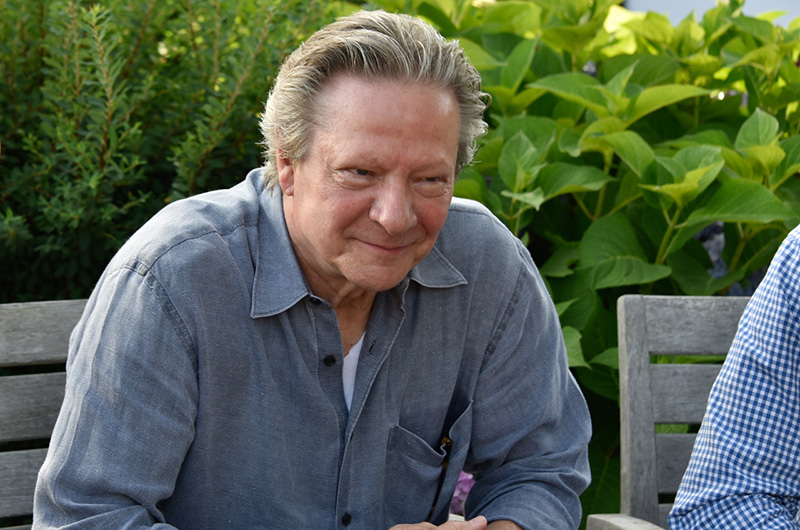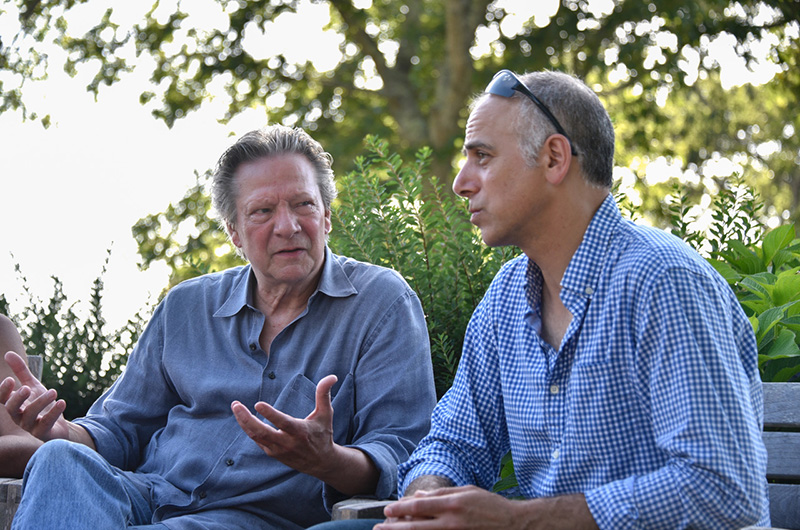Academy Award winning actor Chris Cooper and his wife, actress and writer Marianne Leone Cooper, have played many roles their lives: a deranged horticulturalist in Adaptation, a ruthless government agent from The Bourne movies, the mother of a criminal protege in The Sopranos. But the role they are most proud of playing is parents to their son, Jesse, who was born with cerebral palsy and passed away unexpectedly at the age of 18 in 2005.
Their experience parenting Jesse led them to documentarian and filmmaker Dan Habib, whose work has focused primarily around his own son with cerebral palsy, Samuel.
“About 10 years ago,” Mr. Habib recounted, “the Coopers and I were at a banquet together, and we quickly realized how much we had in common. We’ve stayed friendly ever since.”
Mr. Habib’s most recent work, which showed on the Vineyard Tuesday as part of The Martha’s Vineyard Film Festival and will premier nationwide in the fall, is an hour-long documentary called Intelligent Lives. The film follows three young adults with intellectual disabilities — Naieer Shaheed, Micah Fialka-Feldman, and Naomie Monsplaisir — as they gain independence and learn self-advocacy. Mr. Cooper narrates the film.
Mr, and Mrs. Cooper along with Mr. Habib talked with the Gazette before the film screened Tuesday on the grounds of the Beach Plum Inn in Menemsha.
“When we started this film four or five years ago,” Mr. Habib said, “I knew I wanted to tell the historical piece about how people with disabilities have been treated over the last 100 years, and I thought Chris would be such an incredible voice for that story.”
What Mr. Habib, or the Coopers for that matter, didn’t know, was how Jesse’s own story would weave together the fabric of the narrative.
“It’s such an honor to be a part of this because I have found it extremely hard to talk publicly about the whole experience,” Mr. Cooper said. “But it was good to finally, in little bursts, with narration, give the history of intellectual challenges and get it off my chest, what Jessie had to go through.”
When Jesse was born, his doctor told the Coopers that they should have another child because their first one had a low-IQ and would never be normal. Marianne took 10 years off of acting to advocate for her son. She worked with the state of Massachusetts to remove a special education superintendent who didn’t believe in classroom integration, and soon Jesse became a Latin scholar, an honor-roll student, and had a circle of friends and classmates who loved him.
“I can’t put on film what I’d tell that doctor now,” said Mr. Cooper. “That neurologist, frankly, jumped the gun on our child. Once we got over the hump with Jess, he flourished.”
Mr. Cooper added that maintaining an acting career as the parent of a child with cerebral palsy was difficult. “Some of these films that I did put me on the road, the big productions, for months at a time. I was like a sailor.”
Mrs. Cooper only went back to work when The Sopranos called.

While the movie focuses on three people with intellectual disabilities and disability advocacy, it is really about perceptions of intelligence. Mr. Cooper opens the narration with the question: “Can any measure of intelligence predict a person’s value or ability to contribute meaningfully to the world?”
As the movie proceeds, it shows Mr. Shaheed, a gifted artist with autism, navigate the college admissions process. It tells how Mr. Fialka-Feldman, who was given an IQ of 40 when he was born, received a degree certificate from the University of Syracuse and teaches special education classes at the school. Naomie Monplaisir, who has Down Syndrome and comes from a low-income, non-English speaking background, went to a high school that forced its special education students to assemble jewelry for little-to-no pay. Now she has a $12 an hour job at a beauty salon where every person who walks through the door notices her smile and energy.
“They are all paradigm shifters,” said Mr. Habib.
Mr. Cooper’s narration of Jesse’s story and Mrs. Cooper’s writing tie all those experiences together, and offers a different narrative for disability than the one normally seen on screen.
“We were talking about how the Hollywood culture is guilty,” Mrs. Cooper said, “of showing you a person with a disability and saying they should kill themselves. Million Dollar Baby. Me Before You. We still get scripts like that.”
Mr. Habib wants to work hand-in-hand with his son, Samuel, on his next film. He envisions using an entire production team, from sound editors to visual technicians, who have disabilities.
“The whole idea is to think about disability more broadly,” he said, hoping to move past stigmatized labels like a low IQ. One commonality between Jesse’s story, Samuel’s story, and the story of three subjects in the film is the strength of those around them, be it family, friends, teachers or health specialists. “What I come away with watching this film,” Mr. Cooper said, “is that it all depends on the community, coming to work with these kids. I don’t know any other way to put it.”








Comments
Comment policy »